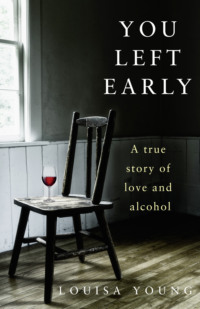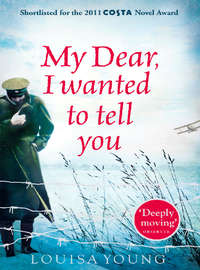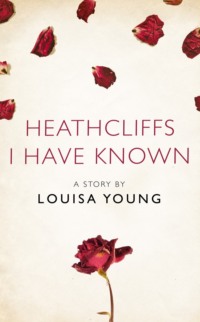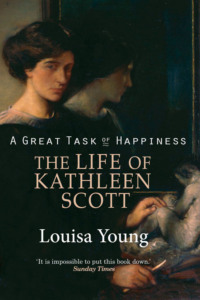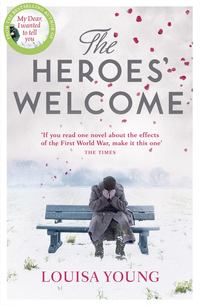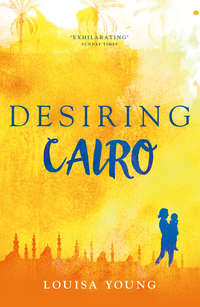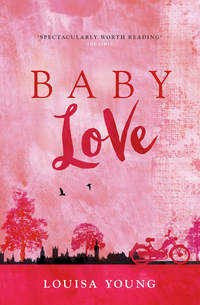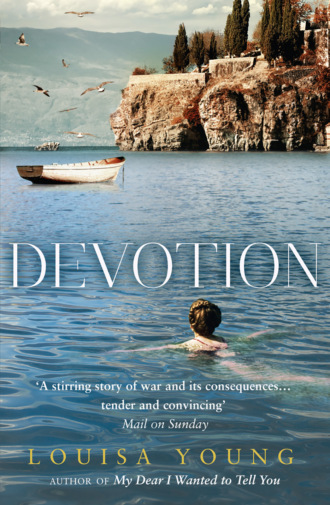
Полная версия
Devotion
She really wished he were with them. But so be it. His inability to be there with them was exactly the kind of thing that they, nine years into their marriage, could smile about and accept. She could accept all kinds of things now. She had accepted Julia’s death – because there’s nothing to be done about it. And Riley’s wounds – because look how he is overcoming them – though she’d hesitate to use the word ‘accept’ to describe how he was about it. But his practicality, his everyday perseverance … yes, there were times when she didn’t think about it, and, she thought, nor did he. And she accepted not being a great artist – because I am an artist, and to be an artist at all, of any kind, and to be paid for it, is a joy and an adventure. And being mother only to other people’s children – ditto.
But all that said, Rome stirred her up.

Tom woke early and tried to head off out without being seen, but Susanna spotted him, sat him down and fed him hard cinnamon buns and milky coffee, by which time the girls and Nadine had appeared, so after a frustrating delay – Down to Gehenna or up to the throne, he travels the fastest who travels alone, Tom muttered to himself – they were all sent out to acquire onions. Tom and Kitty saw, for the first time, places that would become so familiar later: the butter-coloured synagogue, the small local market and the big astonishing one at Campo dei Fiori, the piazzas and alleys and temples along the way, the giant pines the shape of umbrellas, the scraps of road and ancient wall for larking on. Sheep asleep in the shade of gigantic arches. A cart piled high with baskets of chickens. Nadine walked like a dreamer, smiling and pointing things out. Tom felt her love like a hand on the back of his collar.
They stopped at a café for cool bittersweet spremuta di limone, made from huge lumpy Sicilian lemons with leaves on their woody stalks. Kitty’s feet, swollen in her little brown sandals and speckled with mosquito bites, were hurting, so Tom and Nenna were allowed to go on alone.
He walked beside her, suddenly silent. She wasn’t chatty as he had seen her be with Kitty. He didn’t know much about girls. Some chaps had sisters, some of whom giggled. She didn’t seem to be like that.
‘Vuoi vedere le statue parlanti?’ she said, suddenly.
He looked blankly at her.
‘Sì,’ he said, and thought quickly about it in Latin: parlanti – from parlare, to talk, sounds like a – not a past participle, what’s it called – anyway, the -ing one. Talking. And did she say vedere? To see?
‘Vedere parlanti?’ he said.
‘Statue parlanti,’ she said. ‘Vuoi vederle?’
Statue. Statu-ay. Statue?
She was leading him: up streets, down alleys, round carts, through crowds, through a great marketplace, where onions were forgotten. They came out into a long piazza like a racetrack, with three fountains down the centre; mighty stone figures and dolphins vivid among the water and green streaks of weed. All around, Latin was written across rearing buildings. Tom recognised it from a print Riley had at home, in which it was flooded and filled with boats: Piazza Navona.
See statues talking?
He smiled and imagined how a statue might lean down to you, stone lips moving like flesh, voice creaky and dry, talking Latin. He spun round, his hands in his pockets, to look at everything.
In a small piazza beyond, Nenna stopped, and said, ‘Ecco. Pasquino.’
It was a statue: battered and ancient, with no arms and not much in the way of legs, twisted on a sort of staircase of a plinth which was pasted all over, like the wall behind him, with printed leaflets and notices. A lot of people were bustling about, with bicycles and shopping baskets, and some men in vests and blue trousers were digging a hole in the road.
‘La statua parlante,’ she said.
Tom thought, It must be an oracle, like Delphi or something. There’s probably a procedure—
‘Do you ask it questions?’ he said.
She raised her eyebrows at him, and looked brave. ‘Va be,’ she said, and straightened her shoulders. Then, with a consciously respectful demeanour and a glance back at Tom, she went up to the statue, pushed herself up on tiptoe and called out, softly, towards Pasquino’s distant and lichened ear.
He did not answer.
‘Is that it?’ Tom said, and Nenna grinned and said ‘Yes!’
‘Statua non parla,’ Tom said, having been working on the Latin phrase since seven streets ago.
‘Può darsi una risposta,’ she said, seemingly perfectly satisfied, and Tom realised that he wasn’t that concerned about the statue, or the tradition, or the superstition, or even the answer. He wanted to know what she had asked.
‘Quale est domandum tuum?’ he asked, and she squinted at him.
‘Domando tuo?’ he said. ‘Domanda tua?’ He knew Italian had vowels where Latin used us or um. Couldn’t remember the gender of the word for question though.
Nenna slid her eyes sideways, and said: ‘Segreto.’ Secret.
He wondered whether to tease her to get it out of her. Teasing, in this Latin/Italian mixture? He didn’t think he was up to it. But he wanted to know. He couldn’t let a girl keep a secret from him. It would be undignified.
They walked in silence for a while, through the hot bright streets, turning into the black shadows beneath high yellow palazzi.
Other than physical force and language, what other tools did he have? He was thinking furiously. Nenna glanced at him.
Perhaps she wants to tell me. Why else would she have taken me there?
So I must just give her another opportunity.
As they rejoined the river, he turned to her and said: ‘Io credo che tuo secretus dire a me volunta. Se non volunta, perche me ad statuam parlante portare?’ Which he hoped meant. ‘I believe you want to tell me your secret. If not, why take me to the talking statue?’
She laughed, of course. And then she stopped laughing, and she stopped and thought for a bit, and then she took him by the hand, which was slightly alarming, and pulled him across the road and into a church: cool, dim, empty. Glancing around, she spotted what she was after, and led him over there.
‘La mia domanda,’ she said, and looked at him fiercely. He nodded.
She pointed at a painting of the Madonna and child, folded her arms in the universal sign of holding a baby, and made the universal rocking-the-baby motion. ‘Bambino Gesù,’ she said.
He got it. ‘Baby Jesus.’
She pointed to herself. ‘Io,’ she said.
‘You,’ he said.
She drew her finger sharply across her throat. The universal sign of murder.
And that puzzled him.
And she made the universal hands-out palms-up shrug gesture of not knowing. And stared, waiting for his answer.
‘La Mia domanda,’ she said very clearly, ‘era se io ho ammazzato il bambino Gesù.’
From a language point of view he understood perfectly. Her question had been, did she kill baby Jesus?
It was from every other point of view that he was confused – so much so that he thought he must have got it wrong. But the only alternative was did Baby Jesus kill her, which seemed even more unlikely. But then many things are unlikely.
They left the church, slipping out into the day which had grown brighter and hotter even during the few minutes they had been inside the church.
‘Why?’ he asked. ‘Your question. Tua domanda. Why?’
Nenna scuffed her shoes on the road, and did a little dance step. She wasn’t looking at him.
‘L’ha detto un ragazzo a scuola,’ she murmured, and would say no more.
He held on to the phrase.

Dear Heart
Oggi ti scrivo in Italiano! I don’t know what the Italian form of Riley would be. Rilino? Reelee? No, not really – today I write to you in English as usual. But I did go shopping with Susanna in what used to be the ghetto, and I said buongiorno a lot, to all kinds of people who mostly seemed to be cousins on Aldo’s father’s side, I think. Susanna introduced me to everybody as cucina which I thought meant kitchen but apparently not. Or perhaps as well. It is all VERY Jewish – you know how in England people are only Christian when they’re in a church, but here it is a part of everything – food, music, traditional lines of work, all kinds of rules and habits, as well as synagogue. Aldo and Susanna seem to have masses of the culture but none of the religion. Interesting – and nobody seems to hold it against them at all. Aldo has a little gang of chaps he plays cards with – Signor Seta next door is his best chum I think – he has quite a saucy wife who wears her floral housecoat very tight – the men all wear hats and have bright eyes and call for each other like small boys wanting each other to come and play—
This is a short and sweet one – like you! I will be home before you know it. Ti adoro! You probably recall what that means.
She had that day taken a long walk with Aldo. Striding beside him she felt like Kitty scurrying after Tom – after all, she’d never had a brother. She smiled. He glanced back, and slowed down for her.
‘You know we came here for our honeymoon?’ she said. ‘I keep catching glimpses of my younger self, loitering in that doorway, say’ – she pointed at the vast, shadowy entrance to an invisible courtyard beyond. ‘Or eyeing up a statue, or considering the light on the river.’
‘Perhaps we passed in the street,’ he said.
‘1919!’ she said.
‘Those strange days …’ he murmured.
‘I’d been a nurse,’ she said.
‘I was a soldier,’ he replied, and they looked at each other, and they both knew that they did not want to look back at those times when their countries had just been at war, and at their selves in the shock of survival.
‘Ah,’ he said, ‘life is long, if you’re lucky, and who knows – who knows what is coming?’ With which she very much agreed.
‘Look,’ he said. ‘The Arco di Tito. Come. I give you a tiny history lesson. So. First Jewish people came to Rome two thousand years ago to ask protection against King of the Syrians, and they stayed. Then later, after destruction of Jerusalem and burning of the temple, Emperor Tito brought Jews back for slaves. Look—’
They were coming up to the great arch, looming against the blue above them.
‘It looks just like the Arc de Triomphe in Paris,’ she said.
‘This is the original,’ he said, with a little swagger. ‘See, look inside.’
The vault of the arch was like a slice through a great church or temple: the ornamental ceiling squares and flowers looking almost Tudor, and the carved stone panels at the sides.
‘Look,’ he said. ‘You see the menorah? Trumpets?’
She looked. ‘Oh,’ she said.
‘And the prisoners carrying them – those are the Jewish prisoners. Jews paid their ransom, and took them into their community – where we still live. Our great great great great etc., etc., grandparents. Good, yes?’
She didn’t know whether to smile or cry.
‘And Tito had a Jewish fidanzata, Queen Berenice. A long long time we have been here.’ They gazed for a while and Nadine thought how little she had ever thought about being Jewish.
As they walked on, he said, ‘Most of Roman Jews won’t walk under that arch. Pride and loyalty. But me, I’m more modern. Not so religious. You?’
‘Not so religious,’ she said.
He took her arm and tucked it into his. ‘Come, my little sister. I buy you an ice cream.’
This full relaxation with this new man in her family made her feel safe, in new territory. A good feeling.

Aldo came in to the kitchen with his trousers wet to the knees again. ‘Forgive my trousers!’ he said. ‘I was fishing in boats—’ and he set down a bucket on the floor. Tom looked into it: thick coils of shining silver, sliding around over and under each other. ‘I make a marinata. Susanna, mi dai l’aceto! Vinegar, for the marinade. Tommaso, you like to cook?’ He was pulling a sprig of leaves from his pocket. ‘Oh – are you kosher?’
Tom didn’t know what kosher was, but he was pretty sure he wasn’t.
‘Bravo!’ Aldo said. ‘It’s no problem because anyway eels have scales – the rabbi says not, but they do – but I like no religion. Your mother is not religious.’
‘Not in the least,’ said Tom, wondering whether Aldo knew that Nadine was not their actual mother, and staring as Aldo, a cloth round his hand, pulled a yard of big gleaming eel by the tail from the bucket.
‘Brava!’ cried Aldo. ‘Religion is no good – stand back!’ and he swung the beast through the air, a great silver arc, and thwacked its head with a loud crack on the marble table-top. And again.
‘It’s still alive,’ said Tom, aghast and delighted.
‘No. That is nervous system.’ Now he was tying string round its tail, and hanging it from a hook on the wall.
‘But it’s writhing—’
Aldo was cutting round its neck. ‘Now we skin,’ he said. ‘You take pincer.’
‘But it’s alive—’
‘No,’ and then with a look, Aldo took the eel off the hook again, laid it on Susanna’s wooden chopping board, and with two blows cut its head off.
‘You want to see something?’
Tom wasn’t sure.
Aldo dropped the eel back in the bucket.
Tom peered in.
The eel was swimming around, coiling on itself like before, headless.
Tom stared. He could say nothing.
‘Not magic. Not a miracle,’ Aldo said, with a grin. ‘Science. Nervous system continues. Don’t tell the girls, eh?’ He grabbed the creature again, hitched it back on to its hook and started to rub salt on his hands. ‘It moves again with salt: look—’ and he put his hands to the skin which twitched and wrinkled even as he started to get a purchase on it. ‘Pincer!’ he cried, and Susanna handed him a pair of pliers. Gripping, he began to pull the skin off, a thick tight leathery sleeve. Then ‘Stand back!’ he yelled again, grinning at Tom as he gutted it, strong slashes down the silver abdomen. A little slither of red and blue fell out on to the floor.
Tom blinked.

At supper, Aldo asked what they had done all morning, and Tom, taken off guard, said they had been to see Pasquino the Talking Statue.
‘And did he talk Nenna?’ Aldo asked, and Tom was worried, he wasn’t sure why, that he had betrayed her in some way. But she just laughed and went and stood behind her father, her elbows on his shoulders and her head resting against his, her greeny-gold corkscrews resting on his smoothed-down black ones, while he explained that Pasquino and the other talking statues were all nonsense and superstition, people used to ask them questions, now they stick up leaflets and notices around them. That was all.
‘But there are notices stuck up all over Rome,’ Tom said, thinking of the ones he’d seen, mostly from the government, against communists, who were dangerous and would prevent jobs and wages and food, or from communists and anarchists, against the government. Plus all the ancient ones in Latin, carved into stone.
‘Respectable people sign their notices,’ Aldo explained. ‘People who put things at Pasquino don’t. People say what they want and they aren’t punished.’
Tom was surprised that adults weren’t allowed to say what they wanted, without being punished. He had only come across that before at school.
‘I read some of the notices,’ he said. ‘They weren’t very interesting.’

Upstairs, during the siesta, Tom took his little Italian/English dictionary, and worked out Nenna’s phrase. L’ha detto un ragazzo a scuola. ‘A boy at school said it.’
He put the dictionary in his pocket. He would need it, he thought, during these linguistically challenging days.

Tom and Nenna were not often alone, and the opportunity did not arise for him to pursue the question of the boy at school and the death of Jesus. Out with Kitty, Nadine or the small boys, Nenna introduced them to every stone animal in the neighbourhood, and many others. Later, in the Piazza della Repubblica, she showed them the fountain full of naiads. Each naiad had a creature of her own: a swan, a horse, a monster, a dragon. Which animal, Nenna enquired, do you want? Kitty walked them all the way back practically home, to the turtle-fountain in Piazza Mattei, because she did not know the word for turtle, and Nenna could not get it from her impersonation, waddling round on all fours, poking her head in and out, much to everyone’s amusement. Tom considered telling them that it was a foolish game, but as the idea formed he realised – with a sense of wonder – that he didn’t have to. He wasn’t at school. He wasn’t even at home. He was just with girls, in a foreign country, and he could do whatever he wanted.
‘Centaur,’ he said.
Whenever they went across into Sant’Angelo, to the ghetto, or Piazza, as Susanna called it, as if it were the only piazza in Rome, which it most certainly was not, they had to touch and greet the four worn and weathered faces on the bridgestone as they passed. It was called the Bridge of the Four Heads, but there was only one head, with four faces. Nenna knew her city so well she could just swagger through it, which filled Tom with a fierce jealousy, because he wanted Rome, he wanted to belong to it, and he – so fair, so pale-eyed – so very clearly didn’t. She had names for the skinny wild cats at the Portico d’Ottavia, and for the fat, ferocious lion and the slender greyhound carved into the front wall of the buildings down the road. The madman on the corner who sang opera greeted her: ‘Nenna La Bella, bella Nenna!’, and sometimes they sang scraps of Puccini and Verdi to each other, joining together in duets and choruses.
One day early on, sitting on the river wall, Nenna sang: folk songs, Roman songs, Venetian songs, Neapolitan songs, boatmen’s songs, songs in dialects, songs in Italian. Songs she knew from her father.
Tom hummed along quietly, picking up words, asking for translations. Michelemmà = Michele mio = My Michael.
Roma divina! The warm air, the wind on his neck, the magnificent smells … Kitty in turn sang ‘London’s Burning’. They sang it as a round, and giggled, and tried to think of a more sophisticated song about London, so Tom sang ‘Ratcliffe Highway’, which Riley’s father John Purefoy had taught him, with its haunting tune and tale of the man who kept running away from the recruiting party, and ended up hanged. Nenna stared at him in sorrow all the way through, and sang a Neapolitan song about four moccatoras, which they could tell was equally sad, whatever a moccatora might be. Nenna taught them a melancholy lullaby: Lucciola, lucciola, vien’ da me, io ti darò il pan del re, il pan del re e della regina, lucciola, lucciola, vien’ vicina. So Tom and Kitty, who did not know that a lucciola was a firefly, and did not know what a firefly was anyway, but understood the insect connection from Nenna’s buzzing flying gestures, and the pan del re from a quick run to the bakery across the way and some gestures into the window, sang ‘Old MacDonald Had a Farm’, with the animal noises – but then feared that they were trying too hard, and felt foolish, until Nenna smiled and started singing ‘Nella vecchia fattoria … ’ to the same tune.
They were quiet for a while after that, till Nenna said carefully: ‘How is it London?’ and Tom said: ‘È bella. Tu vien vicina. Io ti darò il pan del re.’ It’s beautiful. You come near. I will give you the bread of the king.
They sat for hours on the various stone and mud beaches of the island comparing things, playing games, as the river ebbed and flowed. They laid out their opinions and thoughts and preferences for comparison, proceeding with increasing alacrity as each test was passed and each admission approved. Kitty tried to express her regret that they hadn’t met earlier. Nenna was able to make it clear that she had always wanted a sister. Tom relaxed in the company of females. It was very satisfactory.
Later, family legends developed about these first meetings: that this was the first time Tom ever embraced a girl and he never got over it; that Kitty, who thought herself plump and dull, saw a Mediterranean nymph with skin like honey and hair the colour of olive oil, and that Nenna, who thought herself plain, saw a princess, a rosebud, a pink and golden creature out of a fairy tale, and a silver-haired prince like King Arthur. Everyone recognised it as some kind of love at first sight, and when it was time to go home, sadness prevailed.
Конец ознакомительного фрагмента.
Текст предоставлен ООО «ЛитРес».
Прочитайте эту книгу целиком, купив полную легальную версию на ЛитРес.
Безопасно оплатить книгу можно банковской картой Visa, MasterCard, Maestro, со счета мобильного телефона, с платежного терминала, в салоне МТС или Связной, через PayPal, WebMoney, Яндекс.Деньги, QIWI Кошелек, бонусными картами или другим удобным Вам способом.


